- Home
- Lloyd Jones
Mr Vogel Page 18
Mr Vogel Read online
Page 18
Rupert is pining for you and he misses you so much that I have taken him to work inside my pinafore, where he stays all day because he would be confiscated if anyone saw him! Please write soon. I shall despair if I don’t hear from you. Jack and Nosy Parker and the others send their regards, and ask if you will send them some Red Indian head-dresses and a totem pole!
Your ever loving
Bo Peep.
LETTER 11
Dear Little Boy Blue,
I am beginning to despair. I lie awake at night wondering if you ever reached America. I have a terrible recurring nightmare about you at the bottom of the ocean with your eyes open and bubbles coming from your mouth. Miss Hunt says I should persevere, since you were always a survivor, she says, and will bob up to the surface somewhere, at some time or other.
The hospital and the farm buildings are very full. I hear moaning and screams from the soldiers’ marquees, and there is always a huddle of men smoking around the entrances. They look grim, but that may be because they’re well enough to get out of bed for a smoke, and therefore well enough to return to the front. Yesterday Miss Hunt faced a great conundrum. ‘Esmie,’ she said to me, ‘could you possibly make up a cot for a poor mite of five years old who has an acute tubercular spine and is a very urgent case.’ I thought for a few seconds, and then answered: ‘We have enough cotton and chaff to make a mattress, and there is an old spinal chair that would do for a bed, but we have no blankets or rugs, and since your last raid on the blanket cupboard it is under lock and key.’
‘Well,’ she replied, ‘I expect something will turn up, providence has never let us down yet, and nothing is more certain than that the child is coming and must be taken in, even if it has to share my bed.’
Gloomily we retired for the night, and sadly we arose this morning to find the snow thick on the ground and a bitter north-east wind blowing. After washing and giving the children their breakfasts, putting in fresh hot water bottles etc., we sat down to our own breakfasts in that strange brittle light after a fresh fall of snow. Miss Hunt opened her letters, and the first one, from Mrs Swann of Halston, read like this:
Dear Aggie, I have been worrying all day about your poor little children in those open sheds. Are they warm enough in this bitter cold weather? I cannot rest for fear you have not warm blankets enough, so I have telegraphed to Maddox’s to send you by the first train thirteen pairs of blankets.
Miss Hunt said: ‘Now you can call this telepathy or coincidence or anything else you like, but this thing has happened so often here that I humbly prefer to call it a direct answer to prayer.’
Nosy Parker is writing a history of the hospital and he goes around looking ever so important, asking all sorts of questions and writing them down with a big carpenter’s pencil which looks like a spear in his hand. Talking of spears, Miss Hunt joked with me yesterday that perhaps you had been scalped by the Red Indians for your violin, but I became so tearful that she almost cried herself, patting my head and pressing a handkerchief into my hand. As a consequence she gave me a book to read, which is rather dry but since it was owned by Dr Robert Jones I treasure it and read a page during my last few minutes before prayers nearly every night. It is a book by a man of long ago, called Thomas Pennant, and is a tour of Wales, where Dr Jones lives. It is a land full of princes and poets and strange people, including a very strong woman who builds boats, makes harps, beats all the men at wrestling, and has a pack of hounds for hunting! No doubt your new home is also strange and wild! Today as I worked in the workshop someone delivered a dog cart as a gift, to be used as a conveyance for our children. Inside it I found a small enamel disc with a dancing bear embossed on it, and thinking immediately of Rupert I took it and polished it – you will find it enclosed within the folds of this letter. I will continue to send letters, though you don’t answer. Even if you don’t care for me any longer, I still wonder at your progress among the heathens – are their pow-wows and war cries stunned into silenced when they hear Abide With Me? I do hope you have not taken one of the squaws as your wife and settled in a tepee. Edwin has been quiet of late and I am worried about him, for very little dampens his spirits usually. He has confided in me that the cause of his ill-humour is the soldiers, for his own father was a soldier also and ill-treated him terribly, causing his own son’s malformations. I feel sorry for Julius – his family is interned somewhere, he does not know where, and he still cannot speak our language, but he has lovely eyes, big and blue, and he follows me around like a little puppy all day, so that we are the cause of much mirth all along the hospital. One night I woke up to find him in bed beside me, his little arms around me, as if I were his mother. I let him be, but shifted him to his own bed on the other side of the partition as dawn broke.
I will end with a loving message from your own dear Rupert, whom you must miss more than anything in the world!
COME HOME SOON I NEED YOU!
You are forever in my thoughts.
Bo Peep.
LETTER 18
Dear Little Boy Blue,
Greetings from a lonely voice across the water. It has been an inestimable time since I saw you, and since I have not heard from you I must accept, reluctantly, that you have either perished or failed to reach America. Miss Hunt said you were a survivor; I offer up my earnest prayers that I shall see you again one day. For the present I will desist and wait for a sign that you are there, it is more than my heart can bear to write into this void which separates us. Perhaps the war is responsible – perhaps my letters are not reaching you on the other side. I wish it so; nothing would grieve me more than to know that you are reading my letters, yet not replying. You have that side to you. I remember when little Luther came to us, with his simple ways. His mother would come to see him every month, and as soon as she made a move to leave he would ask her to fetch one of the newspapers from the corner. She always did so, without understanding why he wanted such a strange thing – after all, he was simple and could not read. She noticed that often he held the newspaper upside down. Her inquisitiveness grew too strong one Sunday, if you remember, and she returned to see what he was looking at. He was crying. He wanted the newspaper so that he could hide his tears when she left him. You were the only one who was not affected. You just lay in your bed and looked at him, without a tear.
We are already tired from the war. I fear that 1915 is going to be a tiresome year, and a wet spring has given way to a dismal July – it is the fourteenth – covered over by grey skies and black thoughts. The hospital is clogged with mud and limping soldiers. Miss Hunt tells me that Dr Robert Jones is performing heroic deeds with his medical teams at the front. His new splint has saved thousands of lives.
Jack sends his regards. He is confined to the dormitory for a month because he was caught smoking with the soldiers. Luther has learnt to spell his name at last, and he won all the prizes at the sports. He is very quick and he does not seem to notice the pain he must suffer in his spine. Nosy Parker has finished his history of the hospital but is cross because he must wait for Dr Jones to return from the war before he can complete his great work. I am generally well, though I have two callipers now instead of one, and my walking is going through a difficult phase. Little Julius goes with me everywhere. This morning, for the first time since he arrived, he was not by my side when we walked to the breakfast room. He had simply vanished. I searched and searched, and eventually found him in the tent which remains from the diphtheria outbreak. He was playing with a little girl, the sole remnant of the epidemic. He had felt sorry for her. I chided him and dragged him away, but because of his language problems he did not understand that the area was out of bounds. I hope he has not caught it. Strangely enough, I am not feeling so grand myself tonight, so I will seal this letter, my last, with loving kisses from myself and your ever faithful Rupert, who looks very dandy because I gave him a clandestine bath last night when no-one was looking. His fur is soft and sweet-smelling and his eye has an extra lustre. In accordance with your wishes
I have not sown on another eye to match it.
May the winds of the ocean blow a thousand kisses to your sweet lips.
I will be your everlasting friend, as I promised you that Christmas Day long ago. Goodbye my sweet. I shall see you in heaven if not sooner.
Bo Peep.
LOST AND FOUND
SO, my friends, our story takes a step towards its final resolution. Are your feet hurting yet? After all, a long journey such as ours wouldn’t be the same without a bit of pain, would it? Irish pilgrims walk up Croagh Patrick barefoot, do they not? And there’s a far more arduous pilgrimage, ending in Tibet, in which thousands of penitents travel for up to 2,000 miles: ‘They prostrate themselves on their faces,’ noted the Everest mountaineer John Noel, “marking the soil with their fingers a little beyond their heads, arise and bring their toes to the mark they have made and fall again, stretched full length on the ground, their arms extended, muttering an already million-times-repeated prayer.’
Let’s face it, this hajj of ours is a breeze.
We learn a lot from the Bo Peep letters, I believe. If you’re still stumbling along behind me on this madman’s trail you will have noticed that Little Bo Peep lets slip in one of her letters that her real name is Esmie.
Esmie Falkirk? Surely she must be the same Esmie Falkirk whose name was inscribed on that plaque on Doctor Robert’s pagoda many chapters ago. The Bo Peep letters contain other names from the Vogel Papers: the Factotum is there, and Edwin, and Angelica, and Nosy Parker. They’re the same people, but they’ve been taken to another time, another place – they’re in a children’s hospital, and it’s wartime.
The Bo Peep letters also contain an incident in which a wooden figure of Christ splits. Edwin mislays it for a day. Ring any bells? And Jack, the landlord of the Blue Angel is there also, with his daft ‘I’ve hit my head’ routine.
You’re quite right, this book has more freaks than a Fellini film.
There’s a one-eyed teddy bear, just as there is in the Vogel Papers, and there’s another common factor – Bo Peep reveals that her birthday is on that most freakish of dates, which was also the date on which Doctor Robert died and Mr Vogel won his fortune – February 29th.
And what has Mr Vogel got in common with that date, February 29th?
I think you’ll agree that they are both anomalies – blips, deviations, irregularities.
But let’s look at it another way.
They are also additions – little extras.
They are enhancements and elaborations – and they are both means of correcting a slight imbalance caused by too much regularity.
Normality can never walk normally unless there’s a flaw to walk on.
Do you know what? I’ve a sneaky feeling that the Vogel Papers were a complete fiction – a fairytale construed around actual events which happened many years previously, real events which took place on a children’s ward.
But enough of conjecture – we’ll follow that trail later.
There’s a blemish in my great trek, and I put it there.
A tiny little kink, which means that you – yes, that’s you, the tethered herd lowing in the urban cowsheds of Little England – can never follow exactly in my path. Well, not legally anyway. This is how it came about.
I had been walking alongside the river Dee all day. A bore had swept upstream (I will allow you some sarcasm here), flicking cormorants into the air.
I stopped at a village called Holt, on the Welsh side of the river, which is linked to the English side by a fine red sandstone bridge. The river doodled below me in a lazy, Sunday morning in bed sort of way, and I crossed over to visit Farndon on the English bank. These two villages rub along pretty well nowadays, though some people can still remember unpleasant scenes outside the Saturday night dances when mixed race partners left hand in hand. I called into a pub for a drink, and inquired about Pickhill Hall downriver. This impressive old hall has a dinky accompanying bridge over the Dee in its grounds. I figured this route would save me a few miles if I could get across the bridge, but there was no public access marked on my map.
‘Don’t worry,’ said the pub lady, ‘my husband used to work there and you’re allowed across the bridge.’ I checked with another person on the way: his story was different. I chanced it anyway.
When I arrived at Pickhill Hall I strode up to the building purposefully, since lurking about is bound to get you noticed (and usually disliked). There was an old geezer kneeling by a door, painting it, and I asked him for advice. He was very pleasant, and as it happened he’d cycled around Wales in his salad days. We swapped reminiscences.
‘Strictly speaking, you’re not allowed to cross it,’ he said in a fatherly way, ‘but I don’t suppose anyone will bother trying to stop you today. Mind the ha-ha, though.’
I minded the ha-ha and reached the bridge, one of those old bolted steel affairs, with rotting planks and barbed wire strung all over it like Christmas decorations. I found a point where I could climb the superstructure and worm my way through the barbs, then I dropped down on the other side feeling more daring than a Colditz escapee. It took me ages, however, to find a way out to a road without exciting the interest of local farmers. Still, if the SAS want any tips they know where to find me.
It’s time for one of my blind diversions: up a gully, through trees, and along a steep path to that vantage point over there, where we can view the world’s crowded forum again. Let’s put the map away, rest for half an hour and observe dots moving in the distance and gaze at faraway smoke plumes, admire puffy little clouds perched on those far-off peaks like old men’s wigs, while I take you into the parallel landscape of the mind. My topic during our respite this afternoon is Running Away (there’s a possibility I may wander off myself occasionally – my mind is consumed by a certain Emmeline).
Every year more than a quarter of a million people are reported missing in Britain. Of those 250,000 troubled souls about 100,000 are under 18. They are from all age groups, ethnic origins and income groups, and from all areas.
Of the people reported missing no less than 8% are found dead. Some have been murdered, others have committed suicide, and others have met with accidents.
All these troubled souls have upped sticks and gone, taking with them their reasons, which range from problems at home and at work to long-term stress, general unhappiness, debt, redundancy, illness, injury, alcohol, glue-sniffing, drugs, various addictions, school, foul play, abuse and bullying. Although not cited, I suspect that pregnancy is there too somewhere.
In newspaper parlance, it’s a terrible indictment on modern society.
Enough to make you weep. A contemporary of Chaucer’s, Margery Kemp, who was quite obviously doolally by modern standards, spent the latter part of her eventful life going on pilgrimages, and her speciality was crying.
She even sought a licence from the church to wear white and weep. I really admire people who go for it. No half measures.
The ‘disappeared’ are not dissimilar – they walk and they weep, internally or externally. I’ve shed a salty tear or two on my country’s mossy and maternal shoulder.
The freedom to open a door, step outside and carry on walking is the last true freedom we have, except the freedom to kill ourselves, of course. In an over-governed and constrictive state we can still get the hell out of it. The consequences can be pretty dire, and not for a moment will I romanticize them. But the choice is there in its stark simplicity.
I’ve wasted many words so far and got pretty well nowhere. No doubt some of the starters will have given up on our little quest, saying sod him, he’s pissing in the wind – I’ve got bigger fish to fry etc. and they will have peeled off from the little group which started off on this pilgrimage. I won’t chivvy you along, and I’ve no holy grail to promise you. If you want to come, come. The quest is there for the quest alone.
I have, however, prepared a little surprise for you.
I’m not a great one for celebrations, but I think we must
mark the end of our quest somehow, when it comes. Some sort of party – a band perhaps, something upbeat and cheering, like a ceilidh. You don’t walk round Wales every day. Actually, I’ve arranged something already. You’ll never guess where it is – I’m sure you’ll be tickled pink.
The Blue Angel – where else!
I had a word with the people who run the antiquarian bookshop there – gave them some guff about ‘end of a mission’ and ‘suitable place’ and ‘accomplishment’ and ‘a fitting time to say thank-you to all concerned’.
They fell for it hook, line and sinker. They’re even prepared to allow a bar on our big day. So when we end this walk of ours, and hopefully end the Vogel mystery too, we can have one hell of a party. You can, anyway. I’ll enjoy watching. I’m not a drinker, as I think I’ve told you already, and parties are never quite the same with a Coke in your hand. But hey, what a time we’ll have, and it’ll be great to see everyone all together.
I’ve been musing while plodding along the contours of my beloved Wales. In the way celebrities on This is Your Life or Desert Island Discs listen to the highlights of their lives, or their favourite music, I’ve been pondering over whom exactly I’d like to have with me on the night of the party – except for you lot, of course, the ragtag rabble who have followed me so far. I want the others to be there too, if we ever find them – Mr Vogel, Esmie, Edwin, Don Quixote and Sancho Panza, the one-eyed landlord with a stolen marble in his left socket, the simpleton Luther, Julius Rodenberg, Thomas Pennant, Mr Nosy Parker, Angelica, the whole damn lot of them like spectres at a feast.

 Mr Vogel
Mr Vogel The Man in the Shed
The Man in the Shed Mister Pip
Mister Pip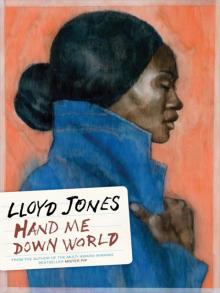 Hand Me Down World
Hand Me Down World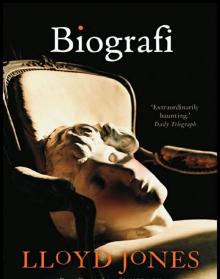 Biografi
Biografi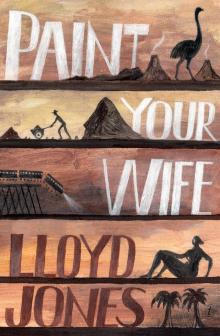 Paint Your Wife
Paint Your Wife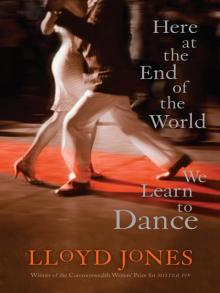 Here at the End of the World We Learn to Dance
Here at the End of the World We Learn to Dance My First Colouring Book
My First Colouring Book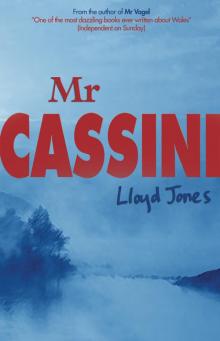 Mr Cassini
Mr Cassini See How They Run
See How They Run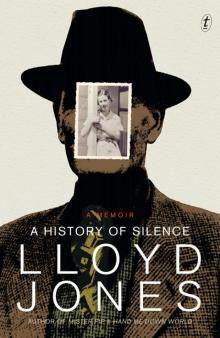 A History of Silence
A History of Silence The Book of Fame
The Book of Fame